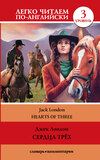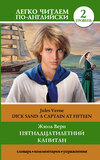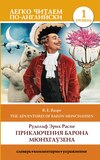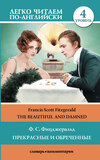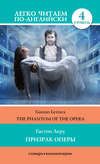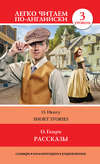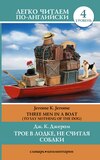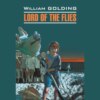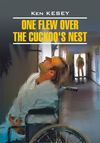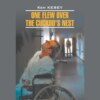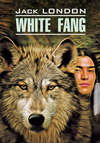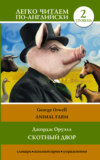Kitabı oku: «Повелитель мух / Lord of the Flies», sayfa 2
He looked round the circle of eager faces. There was no lack of boys to choose from.
“And Simon.”
The boys round Simon giggled, and he stood up, laughing a little. Now that the pallor of his faint was over, he was a skinny, vivid little boy, with a glance coming up from under a hut of straight hair that hung down, black and coarse.
He nodded at Ralph.
“I’ll come.”
“And I—”
Jack snatched from behind him a sizable sheath-knife and clouted it into a trunk. The buzz rose and died away.
Piggy stirred.
“I’ll come.”
Ralph turned to him.
“You’re no good on a job like this7.”
“All the same—”
“We don’t want you,” said Jack, flatly. “Three’s enough.”
Piggy’s glasses flashed.
“I was with him when he found the conch. I was with him before anyone else was.”
Jack and the others paid no attention. There was a general dispersal. Ralph, Jack and Simon jumped off the platform and walked along the sand past the bathing pool. Piggy hung bumbling behind them.
“If Simon walks in the middle of us,” said Ralph, “then we could talk over his head.”
The three of them fell into step. This meant that every now and then Simon had to do a double shuffle to catch up with the others. Presently Ralph stopped and turned back to Piggy.
“Look.”
Jack and Simon pretended to notice nothing. They walked on.
“You can’t come.”
Piggy’s glasses were misted again—this time with humiliation.
“You told ’em. After what I said.”
His face flushed, his mouth trembled.
“After I said I didn’t want—”
“What on earth are you talking about?”
“About being called Piggy. I said I didn’t care as long as they didn’t call me Piggy; an’ I said not to tell and then you went an’ said straight out—”
Stillness descended on them. Ralph, looking with more understanding at Piggy, saw that he was hurt and crushed. He hovered between the two courses of apology or further insult.
“Better Piggy than Fatty,” he said at last, with the directness of genuine leadership, “and anyway, I’m sorry if you feel like that. Now go back, Piggy, and take names. That’s your job. So long.”
He turned and raced after the other two. Piggy stood and the rose of indignation faded slowly from his cheeks. He went back to the platform.
* * *
The three boys walked briskly on the sand. The tide was low and there was a strip of weed-strewn beach that was almost as firm as a road. A kind of glamour was spread over them and the scene and they were conscious of the glamour and made happy by it. They turned to each other, laughing excitedly, talking, not listening. The air was bright. Ralph, faced by the task of translating all this into an explanation, stood on his head and fell over. When they had done laughing, Simon stroked Ralph’s arm shyly; and they had to laugh again.
“Come on,” said Jack presently, “we’re explorers.”
“We’ll go to the end of the island,” said Ralph, “and look round the corner.”
“If it is an island—”
Now, toward the end of the afternoon, the mirages were settling a little. They found the end of the island, quite distinct, and not magicked out of shape or sense. There was a jumble of the usual squareness, with one great block sitting out in the lagoon. Sea birds were nesting there.
“Like icing,” said Ralph, “on a pink cake.”
“We shan’t see round this corner,” said Jack, “because there isn’t one. Only a slow curve—and you can see, the rocks get worse—”
Ralph shaded his eyes and followed the jagged outline of the crags up toward the mountain. This part of the beach was nearer the mountain than any other that they had seen.
“We’ll try climbing the mountain from here,” he said. “I should think this is the easiest way. There’s less of that jungly stuff; and more pink rock. Come on.”
The three boys began to scramble up. Some unknown force had wrenched and shattered these cubes so that they lay askew, often piled diminishingly on each other. The most usual feature of the rock was a pink cliff surmounted by a skewed block; and that again surmounted, and that again, till the pinkness became a stack of balanced rock projecting through the looped fantasy of the forest creepers. Where the pink cliffs rose out of the ground there were often narrow tracks winding upwards. They could edge along them, deep in the plant world, their faces to the rock.
“What made this track?”
Jack paused, wiping the sweat from his face. Ralph stood by him, breathless.
“Men?”
Jack shook his head.
“Animals.”
Ralph peered into the darkness under the trees. The forest minutely vibrated.
“Come on.”
The difficulty was not the steep ascent round the shoulders of rock, but the occasional plunges through the undergrowth to get to the next path. Here the roots and stems of creepers were in such tangles that the boys had to thread through them like pliant needles. Their only guide, apart from the brown ground and occasional flashes of light through the foliage, was the tendency of slope: whether this hole, laced as it was with the cables of creeper, stood higher than that.
Somehow, they moved up.
Immured in these tangles, at perhaps their most difficult moment, Ralph turned with shining eyes to the others.
“Wacco.”
“Wizard.”
“Smashing.”
The cause of their pleasure was not obvious. All three were hot, dirty and exhausted.
Ralph was badly scratched. The creepers were as thick as their thighs and left little but tunnels for further penetration. Ralph shouted experimentally and they listened to the muted echoes.
“This is real exploring,” said Jack. “I bet nobody’s been here before.”
“We ought to draw a map,” said Ralph, “only we haven’t any paper.”
“We could make scratches on bark,” said Simon, “and rub black stuff in.”
Again came the solemn communion of shining eyes in the gloom.
“Wacco.”
“Wizard.”
There was no place for standing on one’s head. This time Ralph expressed the intensity of his emotion by pretending to knock Simon down; and soon they were a happy, heaving pile in the under-dusk.
When they had fallen apart Ralph spoke first.
“Got to get on.”
The pink granite of the next cliff was further back from the creepers and trees so that they could trot up the path. This again led into more open forest so that they had a glimpse of the spread sea. With openness came the sun; it dried the sweat that had soaked their clothes in the dark, damp heat. At last the way to the top looked like a scramble over pink rock, with no more plunging through darkness. The boys chose their way through defiles and over heaps of sharp stone.
“Look! Look!”
High over this end of the island, the shattered rocks lifted up their stacks and chimneys. This one, against which Jack leaned, moved with a grating sound when they pushed.
“Come on—”
But not “Come on” to the top. The assault on the summit must wait while the three boys accepted this challenge. The rock was as large as a small motor car.
“Heave!”
Sway back and forth, catch the rhythm.
“Heave!”
Increase the swing of the pendulum, increase, increase, come up and bear against that point of furthest balance—increase—increase—
“Heave!”
The great rock loitered, poised on one toe, decided not to return, moved through the air, fell, struck, turned over, leapt droning through the air and smashed a deep hole in the canopy of the forest. Echoes and birds flew, white and pink dust floated, the forest further down shook as with the passage of an enraged monster: and then the island was still.
“Wacco!”
“Like a bomb!”
“Whee-aa-oo!”
Not for five minutes could they drag themselves away from this triumph. But they left at last. The way to the top was easy after that. As they reached the last stretch Ralph stopped.
“Golly!”
They were on the lip of a circular hollow in the side of the mountain. This was filled with a blue flower, a rock plant of some sort, and the overflow hung down the vent and spilled lavishly among the canopy of the forest. The air was thick with butterflies, lifting, fluttering, settling.
Beyond the hollow was the square top of the mountain and soon they were standing on it.
They had guessed before that this was an island: clambering among the pink rocks, with the sea on either side, and the crystal heights of air, they had known by some instinct that the sea lay on every side. But there seemed something more fitting in leaving the last word till they stood on the top, and could see a circular horizon of water.
Ralph turned to the others.
“This belongs to us.”
It was roughly boat-shaped: humped near this end with behind them the jumbled descent to the shore. On either side rocks, cliffs, treetops and a steep slope: forward there, the length of the boat, a tamer descent, tree-clad, with hints of pink: and then the jungly flat of the island, dense green, but drawn at the end to a pink tail. There, where the island petered out in water, was another island; a rock, almost detached, standing like a fort, facing them across the green with one bold, pink bastion.
The boys surveyed all this, then looked out to sea. They were high up and the afternoon had advanced; the view was not robbed of sharpness by mirage.
“That’s a reef. A coral reef. I’ve seen pictures like that.”
The reef enclosed more than one side of the island, lying perhaps a mile out and parallel to what they now thought of as their beach. The coral was scribbled in the sea as though a giant had bent down to reproduce the shape of the island in a flowing chalk line but tired before he had finished. Inside was peacock water, rocks and weeds showing as in an aquarium; outside was the dark blue of the sea. The tide was running so that long streaks of foam tailed away from the reef and for a moment they felt that the boat was moving steadily astern.
Jack pointed down.
“That’s where we landed.”
Beyond falls and cliffs there was a gash visible in the trees; there were the splintered trunks and then the drag, leaving only a fringe of palm between the scar and the sea. There, too, jutting into the lagoon, was the platform, with insect-like figures moving near it.
Ralph sketched a twining line from the bald spot on which they stood down a slope, a gully, through flowers, round and down to the rock where the scar started.
“That’s the quickest way back.”
Eyes shining, mouths open, triumphant, they savored the right of domination. They were lifted up: were friends.
“There’s no village smoke, and no boats,” said Ralph wisely. “We’ll make sure later; but I think it’s uninhabited.”
“We’ll get food,” cried Jack. “Hunt. Catch things. Until they fetch us.”
Simon looked at them both, saying nothing but nodding till his black hair flopped backwards and forwards: his face was glowing.
Ralph looked down the other way where there was no reef.
“Steeper,” said Jack.
Ralph made a cupping gesture.
“That bit of forest down there… the mountain holds it up.”
Every point of the mountain held up trees—flowers and trees. Now the forest stirred, roared, flailed. The nearer acres of rock flowers fluttered and for half a minute the breeze blew cool on their faces.
Ralph spread his arms.
“All ours.”
They laughed and tumbled and shouted on the mountain.
“I’m hungry.”
When Simon mentioned his hunger the others became aware of theirs.
“Come on,” said Ralph. “We’ve found out what we wanted to know.”
They scrambled down a rock slope, dropped among flowers and made their way under the trees. Here they paused and examined the bushes round them curiously.
Simon spoke first.
“Like candles. Candle bushes. Candle buds.”
The bushes were dark evergreen and aromatic and the many buds were waxen green and folded up against the light. Jack slashed at one with his knife and the scent spilled over them.
“Candle buds.”
“You couldn’t light them,” said Ralph. “They just look like candles.”
“Green candles,” said Jack contemptuously. “We can’t eat them. Come on.”
They were in the beginnings of the thick forest, plonking with weary feet on a track, when they heard the noises—squeakings—and the hard strike of hoofs on a path. As they pushed forward the squeaking increased till it became a frenzy. They found a piglet caught in a curtain of creepers, throwing itself at the elastic traces in all the madness of extreme terror. Its voice was thin, needle-sharp and insistent; The three boys rushed forward and Jack drew his knife again with a flourish. He raised his arm in the air. There came a pause, a hiatus, the pig continued to scream and the creepers to jerk, and the blade continued to flash at the end of a bony arm. The pause was only long enough for them to understand what an enormity the downward stroke would be. Then the piglet tore loose from the creepers and scurried into the undergrowth. They were left looking at each other and the place of terror. Jack’s face was white under the freckles. He noticed that he still held the knife aloft and brought his arm down replacing the blade in the sheath. Then they all three laughed ashamedly and began to climb back to the track.
“I was choosing a place,” said Jack. “I was just waiting for a moment to decide where to stab him.”
“You should stick a pig,” said Ralph fiercely. “They always talk about sticking a pig.”
“You cut a pig’s throat to let the blood out,” said Jack, “otherwise you can’t eat the meat.”
“Why didn’t you—?”
They knew very well why he hadn’t: because of the enormity of the knife descending and cutting into living flesh; because of the unbearable blood.
“I was going to,” said Jack. He was ahead of them, and they could not see his face. “I was choosing a place. Next time—!”
He snatched his knife out of the sheath and slammed it into a tree trunk. Next time there would be no mercy. He looked round fiercely, daring them to contradict. Then they broke out into the sunlight and for a while they were busy finding and devouring food as they moved down the scar toward the platform and the meeting.
Chapter Two
Fire on the Mountain
By the time Ralph finished blowing the conch the platform was crowded. There were differences between this meeting and the one held in the morning. The afternoon sun slanted in from the other side of the platform and most of the children, feeling too late the smart of sunburn, had put their clothes on. The choir, less of a group, had discarded their cloaks.
Ralph sat on a fallen trunk, his left side to the sun. On his right were most of the choir; on his left the larger boys who had not known each other before the evacuation; before him small children squatted in the grass.
Silence now. Ralph lifted the cream and pink shell to his knees and a sudden breeze scattered light over the platform. He was uncertain whether to stand up or remain sitting. He looked sideways to his left, toward the bathing pool. Piggy was sitting near but giving no help.
Ralph cleared his throat.
“Well then.”
All at once he found he could talk fluently and explain what he had to say. He passed a hand through his fair hair and spoke.
“We’re on an island. We’ve been on the mountain top and seen water all round. We saw no houses, no smoke, no footprints, no boats, no people. We’re on an uninhabited island with no other people on it.”
Jack broke in.
“All the same you need an army—for hunting. Hunting pigs—”
“Yes. There are pigs on the island.”
All three of them tried to convey the sense of the pink live thing struggling in the creepers.
“We saw—”
“Squealing—”
“It broke away—”
“Before I could kill it—but—next time!”
Jack slammed his knife into a trunk and looked round challengingly. The meeting settled down again.
“So you see,” said Ralph, “We need hunters to get us meat. And another thing8.”
He lifted the shell on his knees and looked round the sun-slashed faces.
“There aren’t any grownups. We shall have to look after ourselves.”
The meeting hummed and was silent.
“And another thing. We can’t have everybody talking at once. We’ll have to have ‘Hands up’ like at school.”
He held the conch before his face and glanced round the mouth.
“Then I’ll give him the conch.”
“Conch?”
“That’s what this shell’s called. I’ll give the conch to the next person to speak. He can hold it when he’s speaking.”
“But—”
“Look—”
“And he won’t be interrupted. Except by me.”
Jack was on his feet.
“We’ll have rules!” he cried excitedly. “Lots of rules! Then when anyone breaks ’em—”
“Whee—oh!”
“Wacco!”
“Bong!”
“Doink!”
Ralph felt the conch lifted from his lap. Then Piggy was standing cradling the great cream shell and the shouting died down. Jack, left on his feet, looked uncertainly at Ralph who smiled and patted the log. Jack sat down. Piggy took off his glasses and blinked at the assembly while he wiped them on his shirt.
“You’re hindering Ralph. You’re not letting him get to the most important thing.”
He paused effectively.
“Who knows we’re here? Eh?”
“They knew at the airport.”
“The man with a trumpet-thing—”
“My dad.”
Piggy put on his glasses.
“Nobody knows where we are,” said Piggy. He was paler than before and breathless. “Perhaps they knew where we was going to; and perhaps not. But they don’t know where we are ’cos we never got there.” He gaped at them for a moment, then swayed and sat down.
Ralph took the conch from his hands.
“That’s what I was going to say,” he went on, “when you all, all…” He gazed at their intent faces. “The plane was shot down in flames. Nobody knows where we are. We may be here a long time.”
The silence was so complete that they could hear the unevenness of Piggy’s breathing. The sun slanted in and lay golden over half the platform. The breezes that on the lagoon had chased their tails like kittens were finding their way across the platform and into the forest.
Ralph pushed back the tangle of fair hair that hung on his forehead.
“So we may be here a long time.”
Nobody said anything. He grinned suddenly.
“But this is a good island. We—Jack, Simon and me—we climbed the mountain. It’s wizard. There’s food and drink, and—”
“Rocks—”
“Blue flowers—”
Piggy, partly recovered, pointed to the conch in Ralph’s hands, and Jack and Simon fell silent. Ralph went on.
“While we’re waiting we can have a good time on this island.”
He gesticulated widely.
“It’s like in a book.”
At once there was a clamor.
“Treasure Island—”
“Swallows and Amazons—”
“Coral Island—”
Ralph waved the conch.
“This is our island. It’s a good island. Until the grownups come to fetch us we’ll have fun.”
Jack held out his hand for the conch.
“There’s pigs,” he said. “There’s food; and bathing water in that little stream along there—and everything. Didn’t anyone find anything else?”
He handed the conch back to Ralph and sat down. Apparently no one had found anything.
The older boys first noticed the child when he resisted. There was a group of little boys urging him forward and he did not want to go. He was a shrimp of a boy, about six years old, and one side of his face was blotted out by a mulberry-colored birthmark. He stood now, warped out of the perpendicular by the fierce light of publicity, and he bored into the coarse grass with one toe. He was muttering and about to cry.
The other little boys, whispering but serious, pushed him toward Ralph.
“All right,” said Ralph, “come on then.”
The small boy looked round in panic.
“Speak up!”
The small boy held out his hands for the conch and the assembly shouted with laughter; at once he snatched back his hands and started to cry.
“Let him have the conch!” shouted Piggy. “Let him have it!”
At last Ralph induced him to hold the shell but by then the blow of laughter had taken away the child’s voice. Piggy knelt by him, one hand on the great shell, listening and interpreting to the assembly.
“He wants to know what you’re going to do about the snake-thing.”
Ralph laughed, and the other boys laughed with him. The small boy twisted further into himself9.
“Tell us about the snake-thing.”
“Now he says it was a beastie.”
“Beastie?”
“A snake-thing. Ever so big. He saw it.”
“Where?”
“In the woods.”
Either the wandering breezes or perhaps the decline of the sun allowed a little coolness to lie under the trees. The boys felt it and stirred restlessly.
“You couldn’t have a beastie, a snake-thing, on an island this size,” Ralph explained kindly. “You only get them in big countries, like Africa, or India.”
Murmur; and the grave nodding of heads.
“He says the beastie came in the dark.”
“Then he couldn’t see it!”
Laughter and cheers.
“Did you hear that? Says he saw the thing in the dark—”
“He still says he saw the beastie. It came and went away again an’ came back and wanted to eat him—”
“He was dreaming.”
Laughing, Ralph looked for confirmation round the ring of faces. The older boys agreed; but here and there among the little ones was the doubt that required more than rational assurance.
“He must have had a nightmare. Stumbling about among all those creepers.”
More grave nodding; they knew about nightmares. “He says he saw the beastie, the snake-thing, and will it come back tonight?”
“But there isn’t a beastie!”
“He says in the morning it turned into them things like ropes in the trees and hung in the branches. He says will it come back tonight?”
“But there isn’t a beastie!”
There was no laughter at all now and more grave watching. Ralph pushed both hands through his hair and looked at the little boy in mixed amusement and exasperation.
Jack seized the conch.
“Ralph’s right of course. There isn’t a snake-thing. But if there was a snake we’d hunt it and kill it. We’re going to hunt pigs to get meat for everybody. And we’ll look for the snake too—”
“But there isn’t a snake!”
“We’ll make sure when we go hunting.”
Ralph was annoyed and, for the moment, defeated. He felt himself facing something ungraspable. The eyes that looked so intently at him were without humor.
“But there isn’t a beast!”
Something he had not known was there rose in him and compelled him to make the point, loudly and again.
“But I tell you there isn’t a beast!”
The assembly was silent.
Ralph lifted the conch again and his good humor came back as he thought of what he had to say next.
“Now we come to the most important thing. I’ve been thinking. I was thinking while we were climbing the mountain.” He flashed a conspiratorial grin at the other two. “And on the beach just now. This is what I thought. We want to have fun. And we want to be rescued.”
The passionate noise of agreement from the assembly hit him like a wave and he lost his thread. He thought again.
“We want to be rescued; and of course we shall be rescued.”
Voices babbled. The simple statement, unbacked by any proof but the weight of Ralph’s new authority, brought light and happiness. He had to wave the conch before he could make them hear him.
“My father’s in the Navy. He said there aren’t any unknown islands left. He says the Queen has a big room full of maps and all the islands in the world are drawn there. So the Queen’s got a picture of this island.”
Again came the sounds of cheerfulness and better heart.
“And sooner or later a ship will put in here. It might even be Daddy’s ship. So you see, sooner or later, we shall be rescued.”
He paused, with the point made. The assembly was lifted toward safety by his words. They liked and now respected him. Spontaneously they began to clap and presently the platform was loud with applause. Ralph flushed, looking sideways at Piggy’s open admiration, and then the other way at Jack who was smirking and showing that he too knew how to clap.
Ralph waved the conch.
“Shut up! Wait! Listen!”
He went on in the silence, borne on his triumph.
“There’s another thing. We can help them to find us. If a ship comes near the island they may not notice us. So we must make smoke on top of the mountain. We must make a fire.”
“A fire! Make a fire!”
At once half the boys were on their feet. Jack clamored among them, the conch forgotten.
“Come on! Follow me!”
The space under the palm trees was full of noise and movement. Ralph was on his feet too, shouting for quiet, but no one heard him. All at once the crowd swayed toward the island and was gone—following Jack. Even the tiny children went and did their best among the leaves and broken branches. Ralph was left, holding the conch, with no one but Piggy.
Piggy’s breathing was quite restored.
“Like kids!” he said scornfully. “Acting like a crowd of kids!”
Ralph looked at him doubtfully and laid the conch on the tree trunk.
“I bet it’s gone tea-time,” said Piggy. “What do they think they’re going to do on that mountain?”
He caressed the shell respectfully, then stopped and looked up.
“Ralph! Hey! Where you going?”
Ralph was already clambering over the first smashed swathes of the scar. A long way ahead of him was crashing and laughter.
Piggy watched him in disgust.
“Like a crowd of kids—”
He sighed, bent, and laced up his shoes. The noise of the errant assembly faded up the mountain. Then, with the martyred expression of a parent who has to keep up with the senseless ebullience of the children, he picked up the conch, turned toward the forest, and began to pick his way over the tumbled scar.
* * *
Below the other side of the mountain top was a platform of forest. Once more Ralph found himself making the cupping gesture.
“Down there we could get as much wood as we want.”
Jack nodded and pulled at his underlip. Starting perhaps a hundred feet below them on the steeper side of the mountain, the patch might have been designed expressly for fuel. Trees, forced by the damp heat, found too little soil for full growth, fell early and decayed: creepers cradled them, and new saplings searched a way up.
Jack turned to the choir, who stood ready. Their black caps of maintenance were slid over one ear like berets.
“We’ll build a pile. Come on.”
They found the likeliest path down and began tugging at the dead wood. And the small boys who had reached the top came sliding too till everyone but Piggy was busy. Most of the wood was so rotten that when they pulled, it broke up into a shower of fragments and woodlice and decay; but some trunks came out in one piece. The twins, Sam ’n Eric, were the first to get a likely log but they could do nothing till Ralph, Jack, Simon, Roger and Maurice found room for a hand-hold. Then they inched the grotesque dead thing up the rock and toppled it over on top. Each party of boys added a quota, less or more, and the pile grew. At the return Ralph found himself alone on a limb with Jack and they grinned at each other, sharing this burden. Once more, amid the breeze, the shouting, the slanting sunlight on the high mountain, was shed that glamour, that strange invisible light of friendship, adventure, and content.
“Almost too heavy.”
Jack grinned back.
“Not for the two of us.”
Together, joined in an effort by the burden, they staggered up the last steep of the mountain. Together, they chanted One! Two! Three! and crashed the log on to the great pile. Then they stepped back, laughing with triumphant pleasure, so that immediately Ralph had to stand on his head. Below them, boys were still laboring, though some of the small ones had lost interest and were searching this new forest for fruit. Now the twins, with unsuspected intelligence, came up the mountain with armfuls of dried leaves and dumped them against the pile. One by one, as they sensed that the pile was complete, the boys stopped going back for more and stood, with the pink, shattered top of the mountain around them. Breath came evenly by now, and sweat dried.
Ralph and Jack looked at each other while society paused about them. The shameful knowledge grew in them and they did not know how to begin confession.
Ralph spoke first, crimson in the face.
“Will you?” He cleared his throat and went on. “Will you light the fire?”
Now the absurd situation was open, Jack blushed too. He began to mutter vaguely.
“You rub two sticks. You rub—”
He glanced at Ralph, who blurted out the last confession of incompetence.
“Has anyone got any matches?”
“You make a bow and spin the arrow,” said Roger. He rubbed his hands in mime. “Psss. Psss.”
A little air was moving over the mountain. Piggy came with it, in shorts and shirt, laboring cautiously out of the forest with the evening sunlight gleaming from his glasses. He held the conch under his arm.
Ralph shouted at him.
“Piggy! Have you got any matches?”
The other boys took up the cry till the mountain rang. Piggy shook his head and came to the pile.
“My! You’ve made a big heap, haven’t you?”
Jack pointed suddenly.
“His specs—use them as burning glasses!”
Piggy was surrounded before he could back away.
“Here—let me go!” His voice rose to a shriek of terror as Jack snatched the glasses off his face. “Mind out! Give ’em back! I can hardly see! You’ll break the conch!”
Ralph elbowed him to the side 10and knelt by the pile.
“Stand out of the light.”
There was pushing and pulling and officious cries. Ralph moved the lenses back and forth, this way and that, till a glossy white image of the declining sun lay on a piece of rotten wood. Almost at once a thin trickle of smoke rose up and made him cough. Jack knelt too and blew gently, so that the smoke drifted away, thickening, and a tiny flame appeared. The flame, nearly invisible at first in that bright sunlight, enveloped a small twig, grew, was enriched with color and reached up to a branch which exploded with a sharp crack. The flame flapped higher and the boys broke into a cheer.
“My specs!” howled Piggy. “Give me my specs!”
Ralph stood away from the pile and put the glasses into Piggy’s groping hands. His voice subsided to a mutter.
“Jus’ blurs, that’s all. Hardly see my hand—”
The boys were dancing. The pile was so rotten, and now so tinder-dry, that whole limbs yielded passionately to the yellow flames that poured upwards and shook a great beard of flame twenty feet in the air. For yards round the fire the heat was like a blow, and the breeze was a river of sparks. Trunks crumbled to white dust.
Ralph shouted.
“More wood! All of you get more wood!”
Life became a race with the fire and the boys scattered through the upper forest. To keep a clean flag of flame flying on the mountain was the immediate end and no one looked further. Even the smallest boys, unless fruit claimed them, brought little pieces of wood and threw them in. The air moved a little faster and became a light wind, so that leeward and windward side were clearly differentiated. On one side the air was cool, but on the other the fire thrust out a savage arm of heat that crinkled hair on the instant. Boys who felt the evening wind on their damp faces paused to enjoy the freshness of it and then found they were exhausted. They flung themselves down in the shadows that lay among the shattered rocks.

